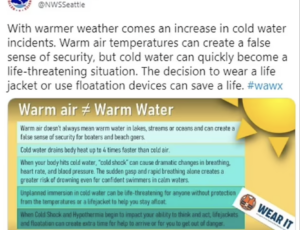Seattle only reached 100 degrees Fahrenheit in recorded history three times, but according to the National Weather Service, it is expected to reach triple digits over the next few days. The temperature could surpass Monday’s record of 103 F.
Washington, Oregon, and the Pacific Northwest were affected by a heatwave with unprecedented proportions. Temperatures were expected to reach up to 30 degrees above normal in some areas.
On the opposite side of the other side of the country, high temperatures in the Northeast will climb well into the 90s by Sunday – well above seasonal averages.

Back on the west coast, the National Weather Service (NWS) issued excessive heat warnings and watches across nearly all of Oregon and Washington state, along with parts of California and Idaho, telling residents that the punishing conditions could be fatal.
NWS Seattle tweeted: “If you are keeping track of the records that fall, it could take several pages by next week.”
Jennifer Vines, from Multnomah County, Oregon said that the heat is ‘life-threatening’. People need to find someplace cool to relax in the coming days.

Around 650,000 people live in the city.
Oscar Suarez is a chef of 31 years at Rose City Futsal, in Portland. He said, “I lived in California for a long time and this place is hot. Oscar Suarez is a chef of 31 years who worked at Rose City Futsal, an indoor soccer venue in Portland.
California opened cooling centers in order to combat the heatwave that has been sweeping through the Pacific Northwest.
NWS reported that temperatures were higher because of a high-pressure dome that formed in the upper northwestern United States, Canada, and Alaska. This is similar to the atmospheric conditions that affected California and the U.S. Southwestern States during the first half of this month.
As concerns over wildfires grow in a region already suffering from a prolonged, devastating drought, extreme temperatures are likely to set new records for the cities and towns of Eastern Washington State and Southern Oregon.
Seattle may reach 100F this weekend, and Portland, Oregon on Sunday could break its 1981 record for 107F.
Extremely hot temperatures are expected to continue in the region until next week.
Residents in a region used to milder summers were thrown into a frenzy by the heat wave in the Northwest. In this area, many residents don’t own air conditioners. The heat wave in a region that is used to milder temperatures has caused panic among residents.
In response to extreme heat in Washington, Governor Jay Inslee has lifted the COVID-19 restrictions on cooling centers operated or owned by government and nonprofit entities.
The state’s capacity is 50% until Wednesday.
Kate Brown lifted all restrictions regarding the capacity of movie theaters and shopping malls with air conditioning. She has also lifted the swimming pool bans. The state will open on Wednesday.

Seattle, according to U.S. Census Bureau 2019 data, has the lowest percentage of homes that have air conditioning (44%) Portland recorded a figure of 79%.
Only 3 units remained.
Sarah O’Sell was one of the lucky purchasers. Her cat was concerned because of triple-digit weather forecasts.
O’Sell said, “Unfortunately we’re seeing this more and more every year. She used a dolly to move her unit from her garage into her apartment.
Due to the extreme weather, Eric McLeod is finding it more difficult to do his job.
McLeod stated that the heat forces us to slow down and concentrate on ourselves. McLeod, a representative of Coastal Flooring, said that we need to put our health first and not production pressure.

USA Track and Field rescheduled several weekend events so that they would take place in the early morning hours. This will allow the athletes to avoid the heat.
In the sweltering heat, families queued to buy ice cream or to spend time at community swimming pools that are still under COVID-19 restrictions.
Sara Stathos was selling ice cream from inside an air-conditioned food truck in Portland and said the business would shut down over the weekend because the ice cream ‘basically melts as we hand it to customers’ in such hot weather.
‘We don’t want people standing out in the sun, waiting and getting sick,’ she said.
Kristie teaches climate change at the University of Washington. Her research focuses on the health impacts of climate change.
The temperatures and extreme heat have been on the rise.

‘I tell my students when they get to be as old as I am, they´re going to look back and think about how nice the summers used to be.’
According to experts, extreme weather events like the heat waves which ravaged America this spring can’t be directly linked to climate change.
In an interview with Reuters last week, NWS Meteorologist Eric Schoening said that as temperatures rise around the globe, unusual weather patterns will be more common.
She also said that heat was a problem in the area because warmer air removes a greater amount of moisture from the soil and vegetation compared to cooler air. It makes everything more susceptible to fire.
Last fall, Oregon experienced a wildfire season that resulted in the destruction of over 1,000,000 acres and 4,000 homes. There were nine deaths.
According to the U.S. Drought Monitor, there are several fires already burning in the Pacific Northwest.
Burn bans are in place across the region. Temporary bans on personal fireworks are also possible for the holiday weekend of 4th July.




